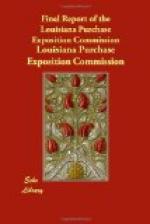The board of lady managers of the Louisiana Purchase Exposition, was, therefore, created as an official organization, acting under the authority given it by the Government. Its most important duty—that of appointing woman jurors—was prescribed by Congress, and all others were secondary to it. The members realized the responsibility which rested upon them and the necessity of making such a record that at the close of the exposition they again might show that women’s attainments and achievements were a factor of sufficient importance to warrant their participation in an exhibition of such magnitude; they must continue to prove by practical demonstration that the rapid advancement and increased usefulness of women, made possible by the educational and other advantages that had been accorded them, rendered their work worthy of the examination and attention of the world.
Preparatory to accepting any responsibilities that might be required of them in order to represent woman’s work officially, a formal request was made by the members of the board of lady managers to the National Commission, to define the full scope of their appointment and the duties to be assigned to the board, careful inquiry being made as to what special and important work they would be expected to perform.
Pursuant to this request, an informal meeting of the eighteen members who had been appointed in the fall of 1901, was called by the National Commission, in the city of New York, for December 5 of that year. Hon. Thomas H. Carter, president of the National Commission, in an address on that occasion, outlined their duties to a limited extent, and stated that a meeting would be called in March, 1902, for the purpose of perfecting their organization and determining the nature of their work. This meeting was not called, as had been contemplated, however, and it was not until September 30, 1902, that the members of the board were again assembled, pursuant to a call of the Commission, the meeting place being in the city of St. Louis.
After formal organization of the board of lady managers they were again addressed by Hon. Thomas H. Carter, who said, in part, as follows:
The act of Congress left the
number of lady managers optional
with the National Commissioners.
Before the exercise of the discretion allowed by Congress numerous persons suggested a great variety of ways whereby the ladies of the country, and the world, if you please, might with force and propriety participate in this coming exposition. The agency or organized clubs was for a time suggested as a proper method by which the assistance of womankind might be interjected into this great work, but many difficulties appeared in an effort to crystallize that thought in the proper shape.
Owing to the confusion existing during the sessions of Congress, the necessity as well as the desirability of allowing the National Commission




